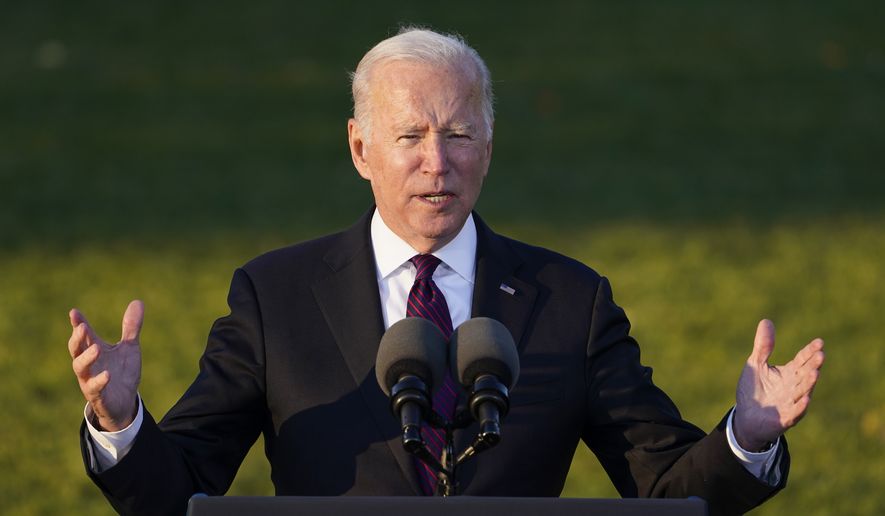President Biden on Monday told Chinese President Xi Jinping that “guardrails” are needed so that tensions between the two nations do not “veer into conflict.”
“As I said before, it seems to be our responsibility — as leaders of China and the United States — to ensure that the competition between our countries does not veer into conflict, whether intended or unintended. Just simple, straightforward competition,” Mr. Biden told Mr. Xi.
“It seems to me we need to establish a common-sense guardrail, to be clear and honest where we disagree, and work together where our interests intersect, especially on vital global issues like climate change,” the president continued saying both leaders had “a responsibility to the world as well as our people.”
Mr. Biden’s remarks came at the start of his three-hour teleconference with his Chinese counterpart. The two leaders are expected to engage in a wide variety of topics, including Chinese military aggression toward Taiwan, human rights abuses, and trade.
The president also emphasized the need for the two leaders to talk “candidly,” saying such open talks were “an important ingredient” to the U.S.-China relationship.
Through an interpreter, Mr. Xi expressed enthusiasm for his meeting with Mr. Biden.
“Good to see you, Mr. President and your colleagues. It’s the first time for us to meet virtually, although it’s not as good as a face-to-face meeting, I’m very happy to see my old friend,” he said.
Tensions between the U.S. and China are at their highest level in decades, but a senior White House official said Mr. Biden will raise areas of potential cooperation during the meeting.
“Even as we compete vigorously with China, we know that as two large countries there are areas where our interests align and where we should be able to work together,” a senior White House official told reporters. “That includes transnational issues, such as climate change and health security.”
Despite weighty issues on the table, the administration has urged low expectations for the meeting saying it’s more to “avoid misunderstandings” than yield specific results.
“This meeting is about our ongoing efforts to responsibly manage the competition, not about agreeing to a specific deliverable or outcome,” the official said.
However, the disagreements between the two leaders are expansive; nearly every issue critical to Mr. Biden’s agenda runs through China.
For example, the supply chain bottlenecks that are raising prices at home are, in part, the result of worker shortages at Chinese plants.
Mr. Biden is pressing nations to take stronger action on climate change, but Mr. Xi did not attend the United Nations climate conference earlier this month. In a written statement, Mr. Xi called for concrete steps to combat climate change, but at the same time did not unveil any new commitments from his country, the world’s biggest carbon-dioxide emitter.
Taiwan remains one of the largest sources of tensions between the two nations.
China in recent weeks has conducted large-scale aerial incursions into Taiwan’s air defense zone, at one point sending more than 150 warplanes to menace the self-ruling island’s government.
China also has been carrying out large-scale naval exercises that appear to be practice for an invasion of the island located about 100 miles off the Chinese coast.
Mr. Biden last month vowed to defend Taiwan against an attack from China, forcing White House officials to later walk back his remarks, saying it does not represent a shift in U.S. policy.
Another possible topic is whether the U.S. would be represented at the 2022 Winter Olympics in Beijing in February. White House press secretary Jen Psaki on Monday dodged reporter questions about the Olympics.
Mr. Biden has twice spoken over the phone with Mr. Xi but they have not met in person.
Secretary of State Antony Blinken also held a call with his Chinese counterpart, Foreign Minister Wang Yi on Friday. That call also focused on Chinese aggression toward Taiwan, according to the White House.
The meeting comes against the backdrop of a Chinese Communist Party meeting last week that further cemented Mr. Xi’s position as supreme leader of China who has abandoned the past practice of serving two terms as party general secretary and chairman of the Central Military Commission, the power behind the party.
The senior official said Mr. Biden hopes to match the Chinese leader and his strengthened position by signing the $1 trillion infrastructure bill prior to the summit.
Still, Mr. Biden is politically weakened at home as voters rage against his handling of the COVID-19 crisis and rising inflation. His infrastructure took months of wrangling with members of his own party. An ABC-Washington Post poll released Sunday said 41% approve of the job Mr. Biden is doing, while 53% disapprove.
Republicans, meanwhile, accused Mr. Biden of ignoring the threat China poses to the world.
“No amount of empty words and broken promises will erase Joe Biden’s long history of ignoring the Chinese Communist Party’s imminent threat while putting America last. As he turns a blind eye to human rights atrocities to pursue his political agenda, Biden has allowed China to threaten American security and our allies’ sovereignty while undermining the advancement of freedom across the globe,” Republican National Committee Chairwoman Ronna McDaniel said in a statement.
• Jeff Mordock can be reached at jmordock@washingtontimes.com.




Please read our comment policy before commenting.